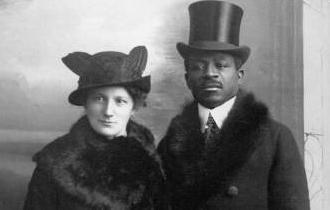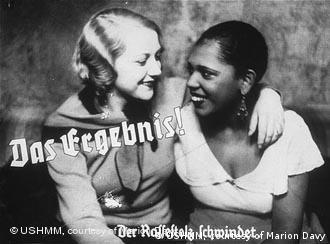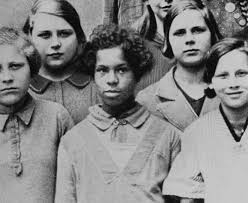Swing in Nazi Germany
Towards the end of World War I in 1918, the constitution of the Deutsches Reich or German Empire was “reformed” in October. On the 29th of that month, a rebellion broke out in the northern city of Kiel led by sailors, soldiers and workers. The rebellion spread and became a full-blown revolution in which the participants split into various councils modeled on the Bolsheviks and their successful revolution in Russia in 1917 that resulted in the formation of the Soviet Union (from the Russian word “sovet” or council). There was little violence and no one was killed. The German revolutionaries called themselves social democrats. There were two main factions of social democrats—the USPD that wanted to make peace immediately and control Germany’s industries in the socialist fashion (essentially state-owned rather than private) and the SPD that favored continuing the war effort and instituting a parliamentary system of government. The German Revolution, as it is now known, caused consternation under the supporters of the old monarchy, namely the aristocrats and the middle class. Was Germany to be taken over forcibly by communism?
The answer came on November 7, when the Revolution entered Munich and resulted in King Ludwig III fleeing Bavaria. Two days later, the German Republic was proclaimed by a joint coalition of USPD and SPD leaders. On November 11, Germany, paralyzed by lack of international support, the joining of America and its vast industries into the war on the side of the Allies, a naval blockade and a severe shortage vital resources, agreed to an armistice with the allies under which Germany would not be put upon to make concessions.
In 1919, a national assembly was convened in the city of Weimar and a new constitution written for the Deutsches Reich. It was adopted on August 11 and the Weimar Republic was born. It would last only 14 years but manage to reform currency and tax laws, institute a railway system and manipulate the Treaty of Versailles by getting its reparation payments reduced through the Dawes Act (Named after General Charles Dawes, a bank president and amateur musician who, in 1911, had published an instrumental piece called “Melody in A Major.” Dawes went onto become Vice-President of the United States in the Coolidge Administration and was awarded a Nobel Peace Prize in 1926. Upon Dawes’ death in 1951, bandleader and composer Carl Sigman wrote lyrics for “Melody in A Major” and a recording was released that year that saw some success. Seven years later, Sigman reformatted it as a rock n roll song and had Tommy Edwards sing it. The resulting recording immediately shot to #1 in September of 1958 under the title “It’s All in the Game.”).
Unfortunately, the Weimar Republic years were also plagued by hyperinflation and wars between various paramilitary organizations from the left and right including the newly formed National Socialistische Deutsche Arbeiterpartei or NSDAP who would be more infamously known to the world as the Nazis. But culturally, the Weimar Republic imported American jazz as well as American and British movies which the younger Germans fell in love with. There was also a great deal of decadence during those years and brothels, strip joints and sex clubs of every type sprang up all over Germany but especially in Berlin and Hamburg (whose Reeperbahn sex district still exists which I visited in the 1980s while I was in the service and all I can say is that there is nothing like it in the U.S.). Black entertainers were popular at the clubs.
There was a small black population living in Germany. A very few were American, most were either from Africa or were fathered by men from Africa. Interracial marriages had been legalized in German in 1890 (but illegal in the United States since the 1850s).

French colonial soldiers from Africa were sent by the French government to occupy the Rhineland after World War I. These soldiers proved popular with the Germans as they were more courteous and well behaved than the French soldiers who were tired of the war and angry at their German neighbors. Some of these French colonial soldiers married German women. The resulting half-black children presented a problem for the Germans, many of whom did not like the idea of these people having German citizenship and being allowed to run for office, vote or join the military. About 400-600 half-black children were born from these marriages and were dubbed “the Rhineland bastards.” In all, about 20,000-25,000 blacks lived in Germany. In a very few cases, white Germans acknowledged them as family—something most white Americans have yet to do.

While thousands of blacks lived in Nazi Germany where life for them was not easy, they were not herded into the death camps nor under any mass extermination order. In fact, Joseph Goebbels, minister of propaganda, found them useful to portray the Nazis’ tolerance of others they deemed inferior. Most blacks tried to become part of a traveling show called “Afrika Schau” run by a woman whose mother was Liberian. She was married to a white German man. Although Afrika Schau was demeaning to blacks, it was a means of survival during the Nazi years. But certainly not all 20,000-25,000 blacks in Germany could be in the show and lighter-skinned blacks were barred from it altogether as they did not resemble the stereotypical idea of black Africans that the average German expected.
At the 1936 Olympics in Berlin, crowds adored Jesse Owens, a Black-American athlete, after watching him consistently beat the best German athletes in the running events. The story that he was snubbed by Hitler is not true. Hitler had been congratulating the German athletes who won medals (the Germans, in fact, did very well in those games) but was told by the IOC that he must congratulate all athletes or none. Hitler was not about to congratulate all of them and could not had he wanted to so by the time Owens won his events, Hitler was no longer congratulating any athletes. But Owens insisted throughout his life that he loved the German crowds at Berlin who cheered him wildly. Such a thing never had happened to him in the U.S. Owens also stated that after he won one of his medals, he passed closed to the box where Hitler was seated and Hitler waved at him and he waved back. Even Hitler had enough decorum to acknowledge the man of the hour.
After returning to the States, however, Owens was almost all but ignored except by blacks who rightfully regarded him as a hero. White-Americans could not have cared less about him. He was offered no endorsements, no movie roles, no book deals. The only money he received was when someone threw a bag containing $10,000 into a car he was riding in during a parade. He, in fact, ended up declaring bankruptcy and was successfully prosecuted for tax evasion. While in Germany, Owens stayed in the same swanky hotels that the German athletes stayed in and given the same treatment. Back in the States, in spite of his victories on the behalf of the U.S., he still was only allowed to stay in “colored” establishments. Owens had to make a living however he could and worked as a sportswriter for a time, at a dry cleaner, as a gas station attendant and a jazz music DJ. As publicity stunts he would outrun racehorses to win bets. He stated, “People say that it was degrading for an Olympic champion to run against a horse, but what was I supposed to do? I had four gold medals, but you can’t eat four gold medals.” While Hitler sent Owens an inscribed photograph of himself after the games were over, Franklin Roosevelt ignored him as did his successor, Harry Truman (“Hitler didn’t snub me – it was FDR who snubbed me. The president didn’t even send me a telegram.”). Not until Eisenhower would Owens receive any recognition from a president for his achievements and the classy way he represented his country in Nazi Germany.
When German filmmaker Leni Riefenstahl was commissioned to make a documentary of the games, she included footage of Owens winning his medals. Goebbels argued that the footage should be removed as it made Germany look bad. Riefenstahl replied that removing the footage would be precisely the thing that would make Germany look bad. Owens won fair and square and it would reflect favorably upon Germany not to shy away from it. The decision was sent to Hitler who never ruled against Riefenstahl over anything (she was the only person in the Third Reich that Hitler would see without an appointment). He said to keep the footage in.
Hitler, however, shrugged off Owens’ victories to Albert Speer as a fact that the Negro physique was superior in running abilities. He railed against the Rhineland Bastards in Mein Kampf and perhaps for this reason, the Nazis sterilized about 400 of them. This was done without their knowledge. The fate of Nazi Germany’s black population remains largely a mystery. Even most Germans did not know blacks actually lived in Germany under the Nazis. There are so few records available that the fates of most of them remain to this day unknown (as a parallel, the number of missing black children in the United States to date is astonishing—upwards of 800,000 in the last five years have vanished without a trace with virtually no mention of it in the media). Some black Germans were known to have ended up in the camps but they were not imprisoned en masse.


Hans Massaquoi applied for membership in the Hitler Youth but was denied.

So Black-American and British culture had made headway into Germany during the Weimar Republic years. Indeed, many Germans loved jazz and ragtime as well as American and British movies when they were available. The younger Germans enjoyed their freedoms and leisure time which they often spent listening to jazz music from America. When the national socialists took power in 1933 with the election of Hitler to the office of chancellor, the Weimar Republic came to an end and the Third Reich began.